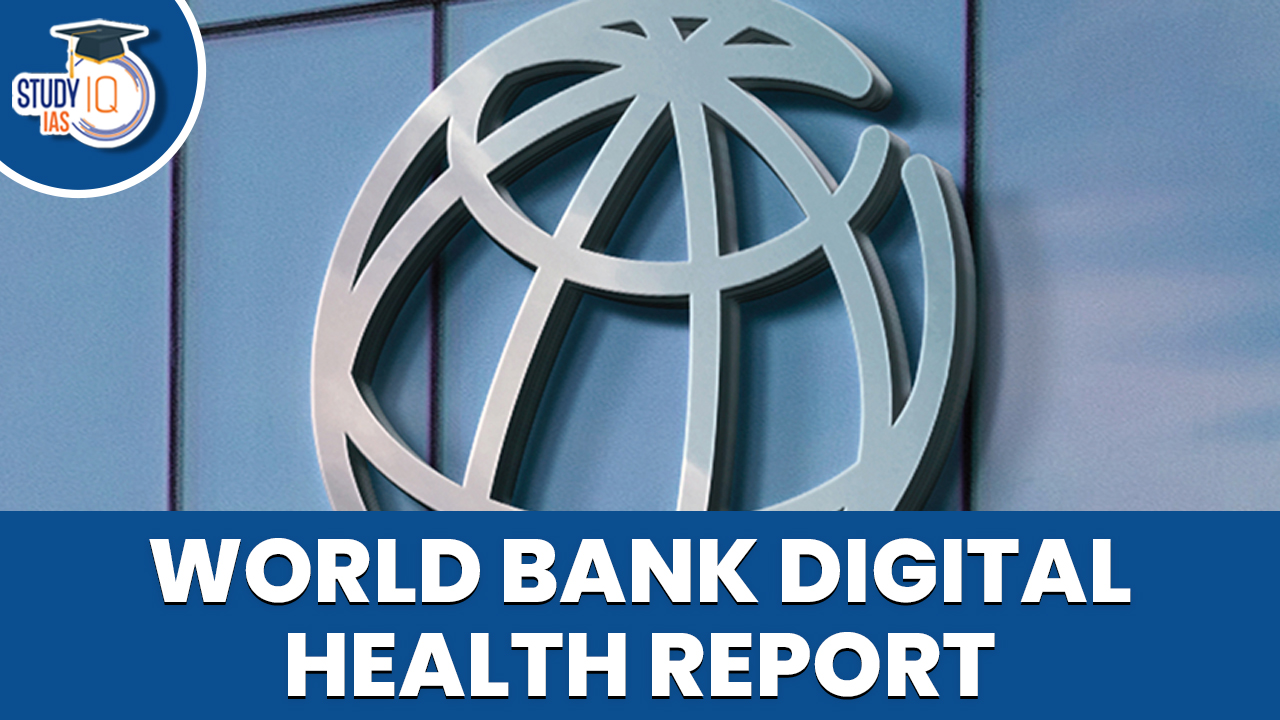Table of Contents
Context: The World Bank released a report titled ‘Digital-in-Health: Unlocking the Value for Everyone’, during the G20 Health Ministers Meeting in Gandhinagar.
Key Highlights of the Report
Various Challenges faced by the Health Systems across the World
- Inequity in Health Care Delivery: Health systems struggle with delivering high-quality care to all, leading to disparities in health outcomes.
- Inadequate Use of Evidence: Only a portion of care is in line with evidence-based guidelines, leading to suboptimal and sometimes ineffective treatments.
- Only 50 percent to 60 percent of care is delivered in accordance with the highest level of evidence or consensus-based guidelines.
- Skilled Workforce Imbalance: Some regions suffer from a shortage of skilled healthcare workers while others have an excess of underskilled ones.
- Access and Affordability: Inequality persists in accessing and affording health services, making it difficult for everyone to use and value them.
- Private-Public Sector Divide: Limited coordination between private and public sector providers hampers comprehensive care delivery.
- Slowly growing health crises: Current health systems are facing threat from the slowly growing health crises such as:
- The impact of climate on health (over 60 percent of all known human pathogens will be aggravated by climatic hazards);
- The rising shares of older people with more complex, chronic medical needs.
- Significant increases in the need for mental health services; and
- The growing burden of noncommunicable diseases, the cause of 75 percent of all deaths in the world in 2022.
How Digital Technology May Help Overcome Health Sector Challenges and Build Value?
- Strengthening Health Systems and Financing: Experiences in countries have shown that digital technology strengthens health systems, improves health financing, makes public health more effective, and reaches underserved populations.
- Personalized Health Services and Cost Management: Used effectively, digital technology makes health services more personal, prevents health care costs from increasing, reduces differences in care, and makes the provision of health services easier.
- Advancing Universal Health Coverage (UHC): Digital technology supports progress toward universal health coverage (see figure).
- Enhancing Efficiency and Cost Savings: Digital technology and data can increase efficiency and save money.
- For example, studies show that African economies like Nigeria, Kenya, and South Africa could save up to 15% of their health system costs by implementing specific digital solutions.

Applications of Digital Technology in Health and Health Care

e-Health, m-Health, and Digital Health
The report discusses the evolution of digital technology in the health sector, including the concepts of e-health, m-health, and digital health:
- e-Health in the Early 2000s:
- E-health emerged in the early 2000s as an expansion of medical informatics to incorporate technology in healthcare delivery.
- E-health aimed to enhance health services and information through the internet and related technologies.
- The focus was on delivering health services and improving health care through the use of technology.
- m-Health in the Late 2000s:
- M-health, or mobile health, gained prominence around 2008 with the rise of mobile communication devices.
- M-health referred to delivering health care services through mobile technologies.
- The term encompassed the use of mobile devices to generate digital data that required management through information systems.
- Shift to Digital Health:
- Over time, the focus expanded to digital health, a broader concept that encompasses various digital technologies to improve health.
- Digital health includes not only mobile technologies but also smart devices, connected equipment, IoT, AI, big data, and robotics.
- The goal of digital health is to solve health system problems and enhance health outcomes.
The concept of “Digital-in-Health” as a transformative approach
- The report discusses the concept of “Digital-in-Health” as a transformative approach to integrating digital technology and data into health systems.
- “Digital-in-Health” refers to a transformative approach in which digital technology and data are deeply integrated and embedded within all aspects of the healthcare system to improve health service delivery, patient outcomes, and overall health management.
- It goes beyond simply using technology to support existing healthcare processes and services.
- Instead, it involves a fundamental shift in the way healthcare is provided and managed, placing digital technology and data at the core of the entire health system.

Way Forward
To help countries embrace a digital-in-health approach, the report proposes three essential areas to guide investments:
- Prioritize evidence-based digital investments that tackle the biggest problems and focus on the needs of patients and providers.
- Connect the regulatory, governance, information, and infrastructure dots so that patients know that data is safe and health workers can use digital solutions transparently.
- Scale digital health for the long run based on trust with sustainable financing, and improved capacity and skills for digital solutions.


 SSC CGL Exam 2025 Apply Online Starts Ap...
SSC CGL Exam 2025 Apply Online Starts Ap...
 Daily Quiz 19 April 2025
Daily Quiz 19 April 2025
 Vehicle-to-Grid (V2G) Technology and its...
Vehicle-to-Grid (V2G) Technology and its...





















